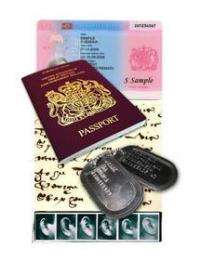ID card can learn lessons from history

(PhysOrg.com) -- Identity theft is increasingly prevalent in today's society, yet we have repeatedly failed to develop a reliable technology of identification to prevent misuse and forgery.
What has driven the expansion of identification techniques over time and in different societies? Why have so few of them worked?
And with controversial ID cards currently at the centre of the political agenda, and the public concerned about a ‘Big Brother’ state, what is the best solution likely to be?
These and other questions about the documentation of identity will be discussed this weekend (26/27 September) at Identifying the Person: Past, Present, and Future, a public conference at St Antony’s. Over 25 experts from around the world will explore the history, current practices and prospects of documenting individual identity on an international scale.
Professor Jane Caplan, Professor of Modern European History at St Antony’s and conference co-organiser, said: 'Attempts to find a dependable way of sustaining reliable ID on a large scale are beset with difficulties, as the historical record shows. As such, this topic is directly relevant to current UK proposals for ID cards and the development of a national identity register for the first time since 1952.
'It is also relevant to controversial global projects for enhancing security and controlling mobility, including, for example, passports, profiling, and border controls. At the same time, however, we will show the origins and purposes of ID are more varied than public debate currently suggests.'
The conference will feature contributions from members of the International Network ‘The Documentation of Individual Identity: Historical and Comparative Perspectives since 1500’. Known as ‘IdentiNet’, and convened by Professor Caplan and Professor Edward Higgs (Essex University), this is an interdisciplinary group of academics based in Oxford’s Faculty of History and sponsored by the Leverhulme Trust. Their aim is to explore the history of individual identification on a comparative global scale from the early modern period to the present.
Topics to be discussed include:
• The search for a ‘foolproof’ technology of identification to prevent misuse, forgery and identity theft - this has a long, unsuccessful history.
• The ethical issues raised by electronic databases and new biometric technologies.
• How the history of state ID is that of distinguishing between legitimate and illegitimate people and movements. This is apparent in the dual purpose of passports, intended to both secure borders against illegal immigrants and security threats, and to enable travel for the legitimate.
• The importance of civil status registration as the basis for securing social and political entitlements.
• The mixed status of certain ID documents and the problem of ‘function creep‘ - a document issued for one purpose comes to be used for other unintended purposes.
Research into individual identity documentation has developed relatively recently among widely scattered researchers. By bringing together worldwide scholars, this conference aims to extend knowledge of why and how individuals have been ‘inscribed’ in durable records in different societies and periods, and how this has influenced relationships between citizens and states, the functioning of social structures and commercial systems, and the sense of who we are.
Provided by Oxford University (news : web)
















